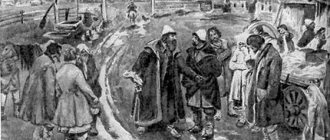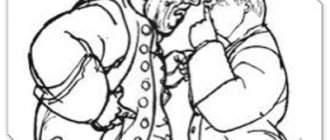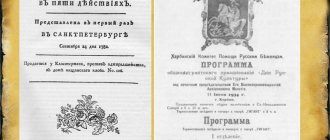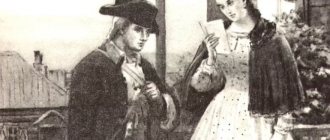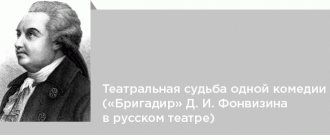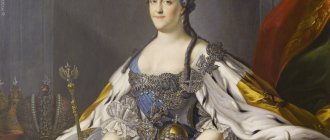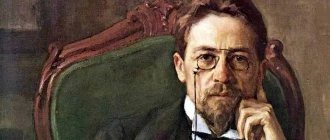Denis Ivanovich Fonvizin came from a Russified German family, whose original surname was von Wiesen. The modern spelling Fonvizin was proposed by A.S. Pushkin much later. At first, Fonvizin studied with private teachers, then he entered the gymnasium at Moscow State University, where he later studied. But he didn’t finish the University; he dropped out to start his military service. While still at the gymnasium, he made his debut as a writer and translator from German: when Fonvizin was a first-year university student, a translator was needed at court, and he was accepted into the service of the College of Foreign Affairs, where he worked all his life. In 1763, Fonvizin moved to St. Petersburg, where he met writers, incl. with Elagin: he joins his circle and becomes a fan of the theory of declinations.
Fonvizin as a playwright
1764 – Fonvizin’s debut as a playwright: he publishes the play Korion . It is poorly written, but in full accordance with the theory of declensions - it is a reworking of the French comedy. After this failure, Fonvizin did not write for a long time; only in 1769 did he create the comedy Brigadier . From this play it is clear that Fonvizin understood: it is not enough just to give the characters Russian names, it is also necessary to introduce Russian problems into the play. In The Brigadier, such a problem is gallomania - imitation of everything French, this was relevant in Russia in the mid-18th century; Another, no less pressing problem is the education of young nobles. But the influence of the theory of declinations is also felt in The Brigadier, because the plot device there is borrowed from French drama - this is the so-called. symmetry in red tape (a situation where in two married couples the husbands simultaneously court other people’s wives). But since the Brigadier was nevertheless sensibly adapted for Russia, it is considered the first Russian play. At first, the production of The Brigadier in the theater was prohibited, because Elagin and Lukin were afraid that Fonvizin would take away their dramatic fame. And, in order to bring the play to the public, Fonvizin began organizing public readings. At one of them he met Count Nikita Panin, the teacher of the heir to the throne, Paul. Communicating with him, Fonvizin began to become more interested in politics and became bolder.
Fonvizin's ideals in the comedy Nedorosl
Fonvizin knew how to distinguish and describe any problems of Russian society, had a good sense of humor, and could think like a state. All this was manifested in his main work - the comedy Nedorosl , written in 1781. However, the comedy was first published only in 1830, after the death of Fonvizin. The main problem that is raised in this comedy is the education of a young Russian nobleman, the idea of enlightenment. This was very relevant in the 1780s, when even Empress Catherine herself thought a lot about education and was opposed to home education with tutors. In the 18th century, there were several philosophical theories about education. According to one of them, initially a child is not a full-fledged person; he only copies the behavior of adults. Since Catherine shared this theory, she recommended tearing children away from their parents and placing them in educational institutions. Fonvizin, who was also a supporter of this theory, shows in the comedy Nedorosl the harmfulness of home education. Fonvizin strives to prove that education is synonymous with happiness. The main character of the comedy is the young nobleman Mitrofan, who has many negative role models before his eyes. Firstly, his mother, Mrs. Prostakova, is a cruel and willful landowner who does not see the point in education at all. Secondly, his nurse Eremeevna is a slave in spirit, from whom Mitrofan adopts the psychology of admiration for the strong (as well as from his father). Thirdly, his uncle, Taras Skotinin, is a nobleman who does not want to serve his fatherland; most of all he loves his pigs. It is emphasized that Mitrofanushka learns something from all of them. Despite the satire, the play was not originally intended to be funny. Contemporaries, reading it, were horrified.
The meaning of the comedy "The Minor"
Pushkin called Fonvizin “a brave ruler of satire,” and the comedy “Minor,” which we analyzed, fully confirms this assessment of the writer’s work. In it, Fonvizin’s author’s position is expressed quite unambiguously, the writer defends the ideas of enlightened absolutism, he does this with extreme talent, creating convincing artistic images, significantly expanding the scope of the aesthetics of classicism, taking an innovative approach to the plot of the work, to the creation of character images, some of which are not It simply represents the expression of certain socio-political ideas, but has a pronounced psychological individuality and expresses the inconsistency of human nature. All this explains the enormous importance of Fonvizin’s work and the comedy “Nedorosl” for Russian literature of the 18th century, the success of the work among his contemporaries and its significant influence on the subsequent development of Russian drama.
Source: Gladyshev V.V. Brief reference book on literature. — M.: FLINTA, 2014
Minor as a work of classicism
The comedy is undoubtedly a work of the era of classicism, but with some deviations from the canonical rules. one rule from the trinity is observed here - unity of place, because All the action takes place on the Prostakov estate. There are hero-masks : Sophia is the mistress, Starodum is the father (although he is not stupid!), he is also the hero-reasoner, Milon is the hero-lover, Mitrofan and Skotinin are negative suitors, Pravdin is the god ex machina. There is no role of soubrette here. The play, as expected, has five acts : exposition, beginning, development of conflict, climax and denouement (which includes an unjustified denouement and catharsis when we feel sorry for Prostakov). The classic conflict of feeling and duty is expressed in the fact that the positive heroes of this play live submissive to reason, the state and the will of their elders. Negative ones become slaves to their feelings, often evil and selfish. Of course, in the end, the positive characters are rewarded with happiness, while the negative ones end up losing. There are many speaking names : Skotinin, Tsifirkin, Milon, etc. The play is written in a low style, easy colloquial language, in prose.
Features of the genre
According to the genre, this work is a classic comedy, it complies with the requirements of “three unities” inherent in classicism (place, time, action), the heroes are divided into positive and negative, each of the heroes has its own role (“reasoner”, “villain”, etc.). etc.), however, there are also deviations from the requirements of classicist aesthetics, and serious deviations. So, the comedy was only supposed to amuse, it could not be interpreted in multiple meanings, there could be no ambiguity in it - and if we remember “The Minor”, then we cannot help but admit that, raising in the work the most important social issues of his time, the author resolves them by means far from comic: for example, at the end of the work, when, it would seem, “vice is punished,” the viewer cannot help but sympathize with Mrs. Prostakova, who is rudely and cruelly pushed away by the ungrateful Mitrofanushka, preoccupied with her own fate: “Let go, mother, how you imposed yourself... "- and the tragic element powerfully invades the comedy, which was unacceptable.. And with the “unity of action” everything is also not so simple in comedy, it has too many storylines that do not “work” in any way to resolve the main conflict, but create a broad social background that determines the characters of the characters. Finally, Fonvizin’s innovation was reflected in the language of the comedy “The Minor”; the speech of the characters is very highly individualized, it contains folklorisms, vernacular, and high style (Starodum, Pravdin), which also violates the classic canons of creating speech characteristics of characters. We can, summing up, conclude that Fonvizin’s comedy “The Minor” became a truly innovative work for its time; the author pushed the boundaries of the aesthetics of classicism, subordinating it to the solution of the task set for himself: to angrily ridicule the vices of his contemporary society, to rid it of “evil morals.” ", capable of destroying both the human soul and public morality.
Need help with your studies?
- 6
10 02 2021
Text added by: Auriath
Urgently! Essay on the topic of the positive ideal of D.I. Fonvizin in the comedy “The Minor” or “The Ideal Hero of Fonvizin”
Answers:
Fonvizin's hero is a teenager, almost a youth, whose character is affected by the disease of dishonesty, spreading to every thought and every feeling inherent in him. He is dishonest in his attitude towards his mother, through whose efforts he exists in comfort and idleness and whom he abandons at the moment when she needs his consolation. Comic clothing images are funny only at first glance. V. O. Klyuchevsky classified M. as a breed of creatures “related to insects and microbes,” characterizing this type with inexorable “reproduction.” Mitrofan is associated with the theme of education, which is important for the educational play. Mitrofan’s teachers were selected in accordance with the norm of the time and the level of understanding of their task by the parents: Mitrofanushka is taught French by the German Vralman, exact sciences are taught by retired sergeant Tsyfirkin, who “speaks a little of arithmetic,” and grammar by the “educated” seminarian Kuteikin, dismissed from “ every teaching." The result of Mitrofanushka’s education is the exam scene, where the student demonstrates complete ignorance, and his mother sums it up: “People live and have lived without science.” Mitrofanushka’s “knowledge” of grammar, his desire not to study, but to get married, are ridiculous. But his attitude towards Eremeevna, his readiness to “take people for granted,” and his mother’s betrayal no longer cause laughter: a despot, an ignorant and cruel serf-owner, is growing before us. Thanks to the hero Fonvizin, the word “minor” became a common noun for a quitter, a loafer and a lazy person.
- 7
10 02 2021
Text added by: beetroot
8th grade positive ideal of Fonvizin in the comedy “Minor”
Answers:
Fonvizin was fully aware of what he was doing, wrote his comedy consciously, and pursued a very specific and very topical political line with it. This line is clearly expressed in the positive characters, and especially in the main one - Starodum, who is the voice of the author himself, and at the same time, he elevated him to the heights of the image of an ideal nobleman. Starodum is in opposition to Catherine’s regime. He resigns because he cannot tolerate the “unjustice” that prevailed in official relations. Starodum separates two eras (Peter’s and Catherine’s), directly contrasting one with the other. In the images of the Prostakovs and Skotinins, Fonvizin sharply criticized those backward masses of serf-owning nobles who were the class base and support of the Catherine-Potemkin regime. With Starodum’s speeches directed against the court, he “destroyed” this very regime.” Malevolent” nobles to the terminally ill Catherine’s court contrasted in the person of the positive characters of “The Minor” - Sophia, Milon, Pravdin (the younger generation) and Starodum (the older generation) - representatives of the liberal-noble camp, bearers of virtues in the spirit of advanced enlightenment, the literary propagandist of which was Fonvizin. All this gave “Nedoroslya” an oppositional political intensity. Fonvizin himself believed that he owed the success of “Nedoroslya” most of all to the “person” of Starodum. But for all their historical character and topical political urgency, the images of Starodum and other positive heroes of the play were devoid of broad artistic typicality. On the contrary, the artistic effectiveness of negative characters continues to be preserved. The relevance of Starodum for Russia has not lost itself at all, they just try not to notice it: just as the nobles of the past did not have good morals, neither do the modern ones. And the fact that they continue to laugh at the Prostakovs and Skotinins is only because modern Skotinins express themselves in normal language, rarely flaunt their love for pigs, and therefore are invisible.
Image system
Let us analyze the system of images of the comedy “The Minor”, which, as required by the aesthetics of classicism, represents two directly opposite “camps” - positive and negative heroes. Here you can also notice a certain deviation from the canons; it manifests itself in the fact that it carries duality; it is almost impossible to classify them as purely positive or purely negative heroes. Let us remember one of Mitrofanushka’s teachers, Kuteikin. On the one hand, he suffers humiliation from Mrs. Prostakova and his student, on the other hand, he is not averse, if the opportunity arises, to “snatch his piece,” for which he is ridiculed. Or “Mitrofan’s mother” Eremeevna: she is reviled and humiliated by her mistress in every possible way, she humbly endures, but, forgetting herself, rushes to protect Mitrofanushka from her uncle, and does this not only out of fear of punishment...



